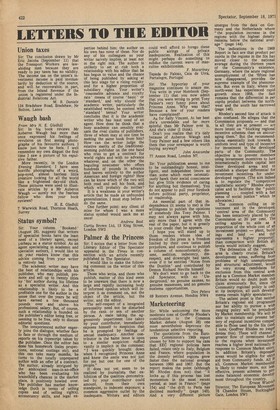Status symbol?
Sir: Your column ' Bookend ' (August 28), suggests that writers of specialist books have the least need of a literary agent, except i.erhaps as a status symbol. As an agent specialising in academic and specialist authors, I would like to let your readers know that this advice coming from your writer is entitely bad.
The academic writer may have the best of relationships with his publisher, who may publish, promote and sell up to twenty titles by 'his' author during his lifetime as a specialist writer. And this relationship is likely to be a profitable one for the author in the sense that over the years he will have earned a few thousand pounds over and above his professional salary. But, of course, such a relationship is founded on the publisher's editor being free, or seeming to be free, only to discuss editorial questions.
The inexperienced author eagerly joins the dialogue, whether face to face or through the medium of reports on his typescript taken by the publisher. Once the editor has done his homework (sales proper.dons, notional castings etc), and this can take many months, he turns to the totally unprepared author with an offer of a contract. The author, already intrigued by the ambivalent man-in-an-office who has been evaluating his brainchild's chances in the market place, is positively bowled over. The publisher has market knowledge (both in terms of selling copies and of selling rights), accountancy skills, and legal ex pertise behind him; the author on his own has none of these. Nor do any of his colleagues as your writer naively implies, at least not in the right mix. The author is unlikely to set at risk both a relationship with his editor that he has begun to value and the chance of being published by asking at this late stage for a rising royalty and for a higher proportion of subsidiary rights. Your writer's ' reasonable advance and royalty rate ' means of course ' basic ' or ' standard,' and why should the academic writer, particularly the established writer, be content with ' standard ' terms? Your writer concludes that it is the academic writer who has least need of an agent. How does he think that a busy academic can sensibly evaluate the rival claims of publishers, three of whom may at one time be seeking the same book from him? How can the writer judge the relative merits of the traditionalseeming publisher on the one hand who tries to get a contract for world rights and with no advance whatever, and on the other the beguiling newcomer who offers hundreds of pounds in advance and leaves entirely to the author American and foreign rights? How can he know which of the two will both read and sell his book, and which will probably do neither?
It is a weakness in your writer's article that he made an unfounded generalization. I must stop before I do the same.
One further point: any client of mine for whom I was a mere status symbol would sack me at once!
Andrew Best Curtis Brown Ltd, 13 King Street, London SW2


































 Previous page
Previous page